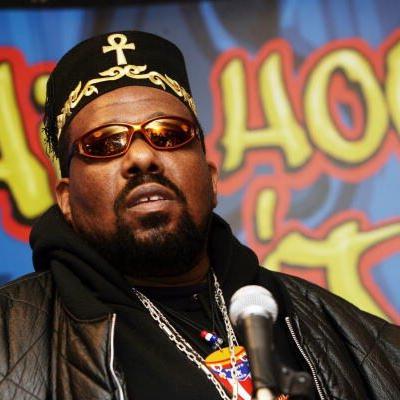
Afrika Bambaataa Net Worth
$500 Thousand
Birth Date:
Birth Place:
Gender:
Nationality:
Professions:
Apr 17, 1957 (67 years old)
The Bronx
Male
United States of America
Record producer , Disc jockey , Social activist , Rapper , Actor

Birth Date:
Birth Place:
Gender:
Nationality:
Professions:
Apr 17, 1957 (67 years old)
The Bronx
Male
United States of America
Record producer , Disc jockey , Social activist , Rapper , Actor
Afrika Bambaataa, a renowned rapper, DJ, and record producer, boasts a net worth of $500 thousand. Widely recognized for his pioneering contributions to the electro and hip hop genres from the late 1970s into the 1980s, Bambaataa also founded and led the Universal Zulu Nation, promoting hip hop's international rise as a culture rooted in peace and inclusivity. In 2016, he stepped down from his role in the Universal Zulu Nation amidst multiple child sexual abuse allegations dating back to the 1970s.
Born Lance Taylor on April 17, 1957, in New York City, Afrika Bambaataa grew up in the Bronx River Projects. Raised by his activist mother and uncle, who were Zulu and Jamaican immigrants, Taylor was influenced by the black liberation movement and his mother's diverse record collection. Immersed in a gang-prone environment, he joined the Black Spades, ascending to a leadership role and spearheading its growth into the city's largest gang in terms of turf and membership.
A cultural and political transformation occurred for Taylor after winning an essay contest that took him to Africa. Inspired by the communities he visited, he adopted the name Afrika Bambaataa, after the Zulu chief Bhambatha. Returning to the US, he formed the Bronx River Organization, aimed at providing an alternative to gang life. This group, comprised of socially aware rappers, graffiti artists, B-boys, and hip hop enthusiasts, evolved into the Universal Zulu Nation in late 1977. The organization sought to steer kids away from gangs and foster a global, peaceful, and inclusive hip hop culture. Over the years, Zulu Nation branches spread worldwide, establishing footholds in Japan, France, Australia, South Korea, and the United Kingdom.
Bambaataa played a crucial role in nurturing hip hop culture from the late 1970s into the 1980s. In 1982, he led the first-ever hip hop tour in Europe along with other artists. Back in the South Bronx, he gained fame as a DJ and created the rap groups Jazzy 5 and Soulsonic Force. The latter group became pivotal in the electro movement with their hit single "Planet Rock," which drew inspiration from German electronic music. Notably, Bambaataa released the first commercial single in the US made on a computer, marking the advent of music computer sampling. His innovations also included the subgenre of "turntablism" and the breakbeat style of deejaying.

Scott Gries/Getty Images
In 1983, Bambaataa collaborated with producer Bill Laswell at Celluloid Records, forming the groups Time Zone and Shango. Shango's debut album, "Shango Funk Theology," was released in 1984. Bambaataa also worked with legendary soul singer James Brown on the iconic track "Unity." In 1985, he joined other artists to record the anti-apartheid album "Sun City." Success continued with Harmony and LG, whose first single he produced in 1987. By the decade's end, he released the anti-violence hit "Self Destruction." Returning to his electro roots in the 1990s, Bambaataa produced a remix of "Planet Rock" and contributed to Leftfield's single "Afrika Shox." In the 2000s, he released albums such as "Dark Matter Moving at the Speed of Light" and "Metal."
In 2016, political activist Ronald Savage alleged that Bambaataa molested him in 1980 when Savage was 15. Subsequently, three more individuals accused Bambaataa of child sexual abuse. This led to the Universal Zulu Nation severing ties with him, prompting his resignation as its leader. Vice magazine published an investigative piece titled "Afrika Bambaataa Allegedly Molested Young Men for Decades." In a 2021 interview, rapper Melle Mel claimed that the hip hop community had been aware of Bambaataa's abuses but remained silent, complicit in their knowledge.